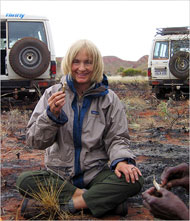Keeping Culture and Identity Alive

"Our work is only a beginning."
Twenty-five years after Dr. Polly Wiessner, professor of anthropology, started her work with the Enga people of Papua New Guinea, the 'Enga Take Anda Tradition and Transition Centre' opened. The material in the Centre represents the 25 years of work on Enga culture and history.
"The purpose of the Enga Take Anda is to keep Enga culture and identity alive in these rapidly changing times," Wiessner said. "Long after a cultural practice has disappeared, its underlying attitudes and values still remain."
In a country with over 800 languages, a Tradition and Transition center is only worthwhile or even possible when there is a one major linguistic and ethnic group. Enga has a population of roughly 300,000 making it the largest body of speakers of any native language in Papua New Guinea.
"We have an awful lot of material, so I sat down with my colleagues and after years of work I thought, 'my gosh, you publish this in books and scientific magazines and it will be valuable for a long time', but the people who it's really valuable to are the people who have lost their culture," Wiessner said.
With everything in the province being buried or destroyed, they wanted to build a place where the young could get a sense of their past and others could share that past. The Centre houses two large exhibition galleries, an auditorium, conference room and library, and is able to accommodate every women's, peace, church, youth and environmental group.
"They just tend to form groups, being they are formerly a tribal society, and they really needed a place to solve problems. They need to understand where they came from to know where they are going," she said. "We have the history of all the tribes, and it really is our obligation to give back."
Wiessner said one of the weaknesses or sins of anthropologists is that they often take the material and publish it but they don't give in return. "That is why we started the project — we realized there was a place that needed cultural education."
Wiessner teamed with the Museum of Natural History where she spent two years collecting old photos dating back to the time of first contact in the 1930's. This made it possible for the illiterate to come in and look at a photo or artifact, the semi-illiterate to read or have captions read to them and the educated to read pamphlets provided. "There is no reading material there, except for the occasional newspaper clipping, and the Enga people love to read," Wiessner said.
There are a lot of social problems over there today. "The Enga culture is being lost very quickly, there is warfare, aids, high crime rates and people have very little sense of their past," she said. Research has been done on history, tradition and change, and three books and close to a dozen journal articles have been produced.
Wiessner recently began working with the BBC in an effort to educate about violence in the highlands and law and order. "We are working on getting a theme where they can portray some of the problems without pointing any fingers."
"Wiessner's work is distinguished by its topical breadth and ground-breaking creativity and by her ability to put theory into practice in ways that make the world a better place, said Elizabeth Cashdan, anthropology professor and chair. "Wiessner's extraordinary global work and international reputation have enhanced the prestige of the University of Utah."
Wiessner said it is both wonderful and boring when you return to a civilized place. "You get addicted to your own chemicals," she said. "Every morning you wake up and something major has happened. Either someone's at war, a school has been burned down, or a church has been burned down. There is just always something going on."
"Through our joint efforts, the people of Enga province will move into the future by building on their past."
About Wiessner:
Wiessner was awarded the University of Utah's prestigious Distinguished Scholarly and Creative Research Award for 2009.
Wiessner's work with the Kalahari Bushmen in southern Africa is shown in the New York Times article, Where Gifts and Stories are Crucial to Survival,by Claudia Dreifus.
Wiessner also carried out work in Vietnam on child nutrition. This was the first research done by a westerner after the war and was carried out under strict police surveillance.
By: Summer M. Rasmussen
